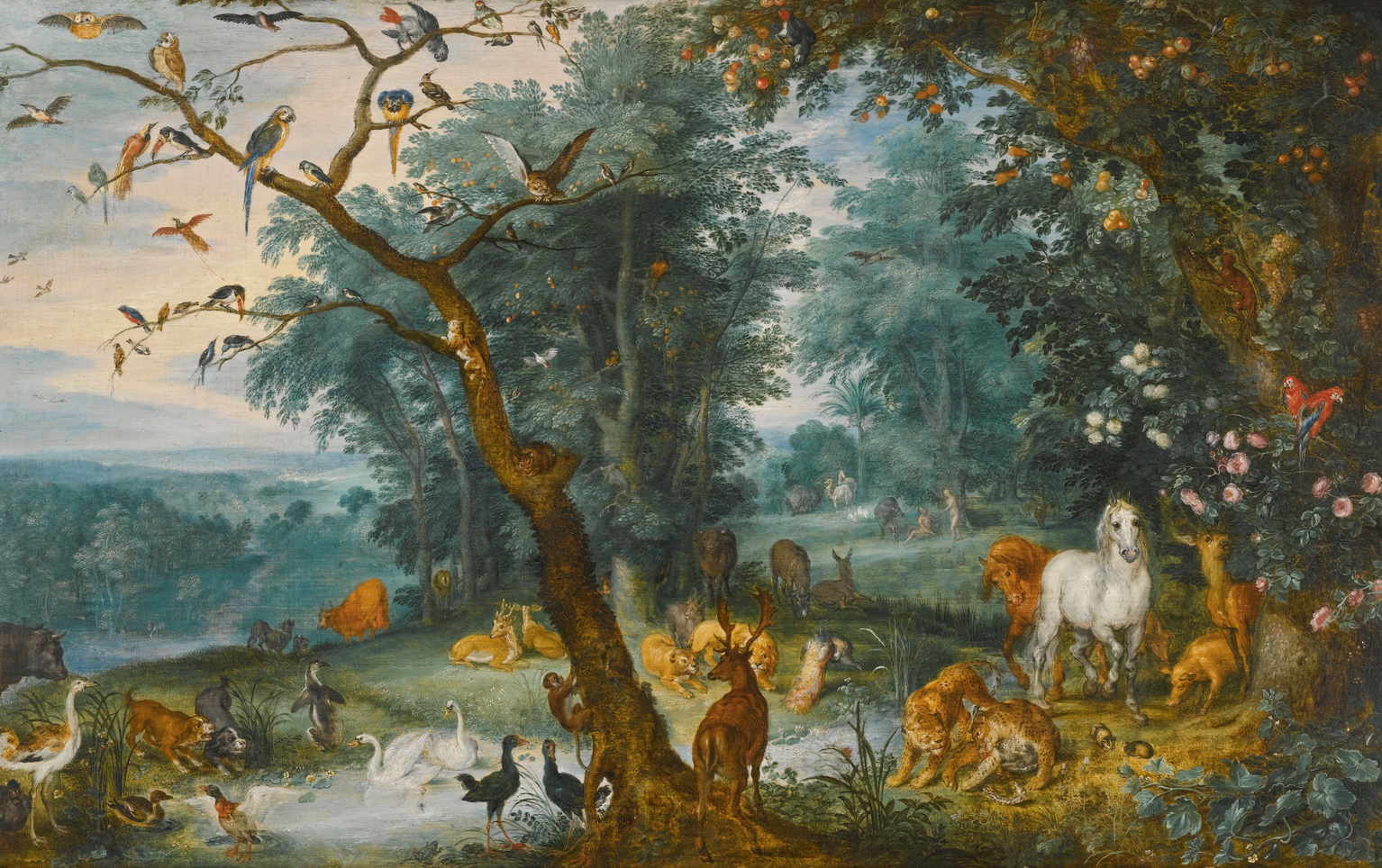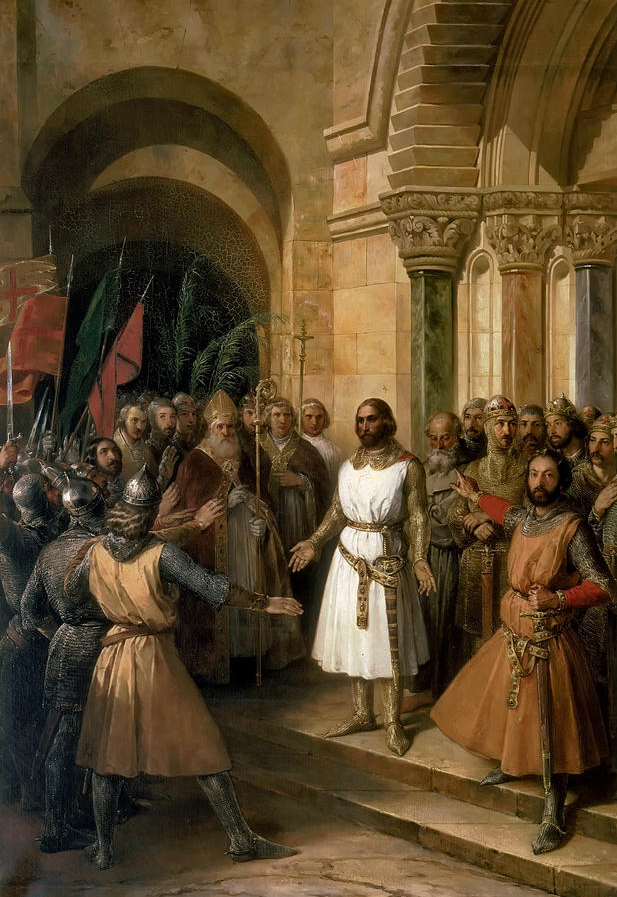Editor’s note: The following is extracted from The Unfortunate Colonel Despard and Other Studies, by Sir Charles Oman (published 1922). All spelling in the original.
It is a noteworthy fact that in almost all the religions of the ancient world, the human soul, though it may be defined as immortal and disembodied, seldom entirely quits this earth. Before the birth of Geography, men imagined the world to be large enough to contain, not only the land of the living, but also the land of the dead, and even the habitations of the gods themselves. The Greek divinities dwelt on an Olympus which was originally earthly and local; so did the Indian gods on their Mount Meru; so, too, the deities of the North abode in an Asgard, which men conceived as a fixed point exactly in the middle of the face of the earth. And if a terrestrial dwelling could be found for the gods, much more could a habitation be discovered for the disembodied spirits of men. Soul-lands, then, whether figured as under-worlds or Isles of the Blessed (to use familiar names), are of almost universal acceptance. With the former class we are not here concerned; but to the latter, when a place on the surface of the earth is assigned to them, we may apply the name “Earthly Paradise.” These, then, form one branch of our subject; along with them must be ranged the Christian Paradise, which was identified with the Biblical Eden — and also the deathless lands, not destined for souls, but for living men, with which we sometimes meet in mediaeval legends.
The regions which belong to the first of these classes are invariably placed in the West. Of this fact the most plausible explanation is, that all the ancient nations, when imagining the journey of the departed soul, had in their minds the journey of the sun, the one god who dies daily, yet who has not really perished, but is only withdrawn from human sight. Nearly every tribe had some knowledge of a sea towards the West, with whose limits they were, in the early part of their history, quite unacquainted. Accordingly the soul-land was usually conceived as lying across the unexplored Western waters. The Egyptian abode of the dead was an exception to this rule, for not sea but desert forms the impassable western boundary of the Nile Valley. But none the less the Egyptian soul-land was placed in the West, though the spirit of the departed had to cross the desert, the “dark land of Apap,” before arriving at the home of Osiris, the hidden sun.
There are two ways in which the setting of the sun into the west may strike the mind of the beholder. On the one hand, the sight of the end of a fine summer day, when the whole horizon is a sheet of vivid colour and the sea is divided by a golden path, calls up ideas of a land of glory where the sun-god rests after the labours of the day. On the other hand, after a day of mist and tempest, when the sun has seemed to wrestle with the black clouds, and finally sinks, swallowed up by them, into a dark and stormy sea, the sight of his end suggests only gloomy thoughts. So we get the double idea of the West, — as the bright Elysian plain or the garden of the Hesperides; and, on the other hand, as the dim shadowy land where the disembodied souls spend an aimless and hopeless existence.
Both these ideas appear in the Homeric poems. Although in the Iliad the “dark home of Hades” is certainly below the earth, yet in the Odyssey when Ulysses visits the shades, he does not descend, but meets them on the misty shore of the land of the dead. Its situation, in accordance with all Aryan ideas, is in the West, or perhaps North-west. Although in the Homeric poems the gloomy view of the after-life — which allots a colourless and unhappy existence to the souls of the greatest heroes, Achilles, Ajax, and their fellows, as much as to the souls of the common herd — is generally found, yet the more cheerful aspect of the West is shown in at least one passage, where Proteus prophesies to Menelaus that his last end will be to come to “the Elysian plain and the ends of the earth, where abides the fair-haired Rhadamanthus; where life is easy for mortals; where is no snow nor storm nor rain, but always the ocean sends up the cooling breath of the west wind,” — a description well known as copied by Lucretius and Tennyson.
In Hesiod we first find this Western land mentioned by the name which afterwards became its proper title, Μακαρων Νησοι.[1] Speaking of the heroes of the Theban and Trojan wars, he makes Zeus bear them away after death, “to have their life and their abode apart from men, so that they dwell undisturbed in the Islands of the Blessed, by the deep-flowing ocean, where the fruitful earth brings forth her harvests thrice a year.”
A similar picture is found in the Olympian Odes of Pindar, who speaks of the Island of the Blessed, round which the ocean breezes blow — where earth and water alike blaze with golden flowers, and the just dwell wreathed with garlands beneath the gentle sway of Rhadamanthus.
After Pindar it is unnecessary to mention the numerous allusions to this Western land which are found in the Greek poets. It seems, however, to be different from Leuké, which would appear to have been a sort of private Earthly Paradise for the hero Achilles. Before the extent of the Euxine was known, he was supposed to inhabit an island in its extreme west, where he was united to Helen, and was accustomed to drive his chariot along the smooth promontory called Achilleôs Dromos.
When the Euxine was explored, the idea vanished, or rather shrank into the worship of Achilles as ruler of the sea at the colony of Olbia, the Greek colony nearest to the legendary position of Leuké.
After a time there came the materializing age of ancient history — that in which all the old legendary spots were fitted with places in the real lands of the Western Mediterranean, when Phaeacia became Corcyra, and Sicily the dwelling of the Cyclops. At this time the Isles of the Blessed were placed outside the Straits of Gibraltar. But some centuries later, about 100 B.C., actual islands of pleasant aspect were discovered in that direction. Hence these, which we now call the Cape de Verde Islands, got the name of Fortunatae Insula? : and though no one asserted that they were inhabited by the souls of the just, yet the old wonders of the isles of the blessed were related of them; and we read of their perpetual spring, and the three harvests a year which they produced. The accounts of these islands in sober geographers, which survived into the middle ages, were certainly one of the reasons which induced the exploration of the Western sea.
Unlike the Greeks, the Romans succeeded to the rule of a world which had been explored; and except in a few allusions in the poets and in Pliny, manifestly borrowed from the Greek, we do not find the islands of the blessed in their old sense mentioned till a very late date. Strange to say, however, among the very last of the Roman authors, as if we were coming on the shadow which the approaching middle ages cast before them, we find the old Western spirit-land of the Odyssey reappearing. In Claudian we meet with the following passage: “There is a land, where the farthest end of Gaul stretches out into the ocean, where Ulysses is said to have invoked the silent folk with libations of blood. Here, even now, the pitiful wailing of the souls is heard as they flit past, and the peasants see pale shapes, the forms of the dead, taking their way from earth.”
This allusion is amplified by the longer passage on the same subject found in the Byzantine writer Procopius, who flourished under Justinian in the sixth century: —
“Opposite the north-western coast of Gaul,” he writes, “there is a large island called Brittia; it is divided into two parts by a wall stretching north and south. East of the wall is a pleasant land which is occupied by the Britons, Angles, and Frisians. What the land to the west is like, no one knows, for its air is deadly to breathe, and any one who passes the wall instantly expires. Now on the extreme north west coast of Gaul,” he continues, “there dwell certain fishermen, subject to the Franks, but excused from all tribute on account of the strange duty which they perform.
“Every night one of these fishermen, in rotation, is roused from sleep by a gentle tapping at his door, and a low voice calls him to come down to the beach. There lie dark vessels, to all appearance empty, but deep in the water, as if weighed down by a heavy burden. Pushing off, the fishermen arrive at the coast of Brittia in one night, though it is on ordinary occasions six days’ journey from Gaul. During the voyage they hear the sound of voices in the boat, but no intelligible words, only a subdued whispering. Arrived at the strange coast, they hear the names called over, and different voices answering to them, while they feel the boat gradually growing lighter; at last the roll-call ceases, and they are wafted back to their country with the same miraculous speed with which they had left.”
Such is the last trace of the old soul-land which we meet in classical literature. In the shrinkage of the known world which followed the fall of the Western empire it has got localized in Britain — and apparently in Wales or Cornwall!
In its next appearance the Earthly Paradise is entirely changed, and in Christian hands has ceased to be the habitation of departed spirits, and has shifted altogether its position on the earth. So greatly is its character altered, that many authorities would derive the mediaeval legends dealing with it, not from any pagan source, but entirely from the literal interpretations of the Bible which obtained in the middle ages. It hardly seems to be due to the principle enunciated at the beginning; and only in its wider developments is it influenced by the old Greek or Keltic beliefs. The true and orthodox terrestrial Paradise of the middle ages lay, not across the mysterious Western ocean, but in the equally mysterious lands of the sun-rising. It was universally identified with the Garden of Eden, in which Adam and Eve had been placed; and it was therefore impossible to seek it in any other quarter than the East. Now in mediaeval times the limits of the known world were shrunken far within the boundaries known to the later Roman geographers, Ptolemy, Strabo, and their fellows. In the twelfth or thirteenth century the Western world knew almost exactly as much, or rather as little, of Asia as Herodotus had known 1,600 years before. The very stories which the father of history related of Indians and gold-producing ants, of griffins and Arimaspi, had returned to their old localities in Central Asia, though in Roman days they had for some time continually receded further and further into the unknown North-east. Now again, as in the fifth century before Christ, men believed that beyond an India of no great extent, there lay no more inhabited lands, but only desert and sea, But unlike the ancients, the mediaevals placed in the furthest part of this region the Earthly Paradise, either as an oasis in an expanse of rocks and sands, or as an island in an unnavigable ocean. Sometimes we read of it as inaccessible by reason of lands of mist and darkness, or insurmountable precipices; sometimes it is tempestuous seas or rivers which bar the way. But beyond them, if a man could but penetrate, he would find the Eden where our first father had dwelt, where rise the four mysterious rivers, and where grows every tree that is pleasant to the sight or good for food.
“There,” says Neckam, “is a beautiful land where whole tracts are overgrown with the noble vine; there are clear springs, and groves watered with pleasant streams. Glorious is the fruit which enriches its gardens, and no sterile tree can grow in its soil. Never do storms come near it, nor violent winds, but there always blows a gentle breeze. Thither never came the waters of the all-destroying Flood.”
“In that Paradise,” says in a more prosaic strain the author of the Polychronicon, “is everything that is congruent to life. It hath salubrity and wholesomeness, for it enjoyeth an equal temperance, feeling neither coldness nor heat, insomuch that nothing that has life may in any wise die within it. In testimony whereof, Enoch and Elias wait yet therein, having the bodies with which they left this life still uncorrupt. Moreover, that place has all pleasantness, for it is the store-house of all that is fair, where no tree ever loseth its leaves, and no flower withereth. There is mirth and sweetness from the fruit and trees that grow there, for every tree that is therein is sweet to eat and fair to see. And there is security, for no harm may come near it, nor even did the water of the great Flood come nigh.”
Thus far all the authorities coincide; but there were certain points in the earthly Paradise which gave rise to dire controversies. Various authors give various situations for it. In some it is a great island lying south and east of “Inde the Great,” apparently occupying the place of Ceylon. Thus it appears in the “Hereford Mappa Mundi” as a circular island enclosed by a wall, lying just opposite to the mouth of the Ganges. But a little later, when Ceylon was more or less known, it receded to a continental position somewhere in China. Still later, when thirteenth-century Europe had heard of Cathay and the Great Khan, the insular theory was revived; and as lying south of China and east of India, we must identify the final position of Eden with Sumatra, Java, or some of the islands in that part of the world.
Here lay Paradise in the early fifteenth century, and from this spot it vanished into nothingness, when in the end of that century the voyages of the Portuguese and Spaniards revealed both East and West, and banished from the world numbers of the old myths which had survived for so many ages. Vasco de Gama, Columbus and Magellan destroyed not only the impassability of the Cape of Storms, the unlimited breadth of the Atlantic, and the unorthodoxy of a belief in the antipodes, but also the beautiful old idea of the Earthly Paradise. Men might still sail to seek Ophir, or the North-west Passage, or El Dorado, but no room was left on earth for the terrestrial Eden. If ever we find it mentioned in books of the sixteenth century, it is because an author is discussing where was the Paradise of Genesis, not where is the beautiful land in which the fourteenth century believed.
___________________________
[1] Macharon Nesoi: Islands of the Blessed. Rendered in the original text as:
![]()
(Continue to Part 2)










[…] (Continued from Part 1) […]